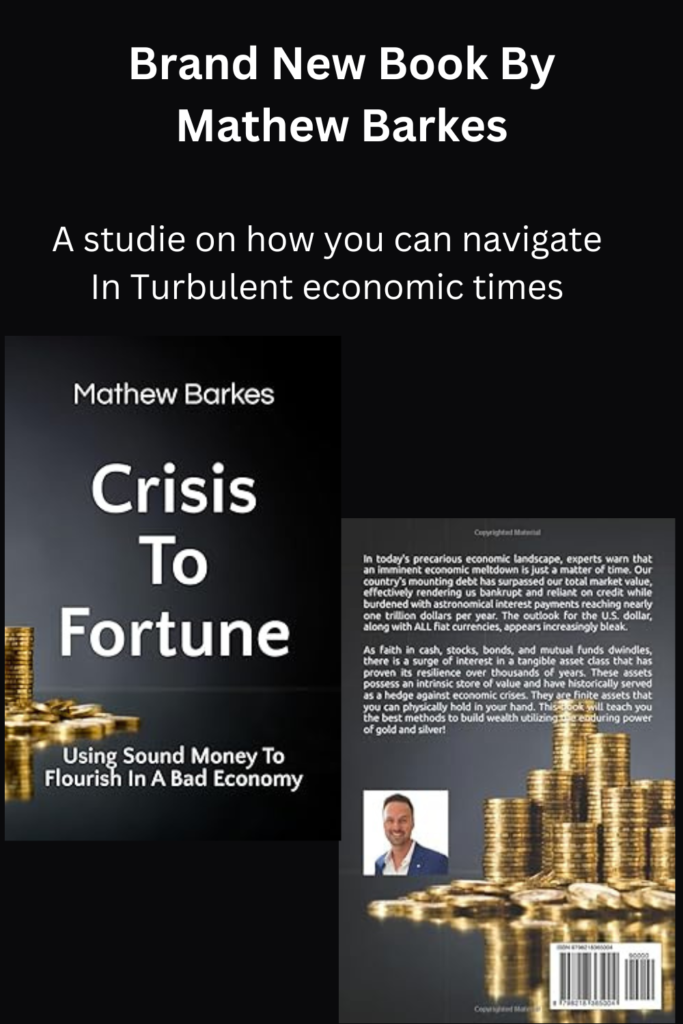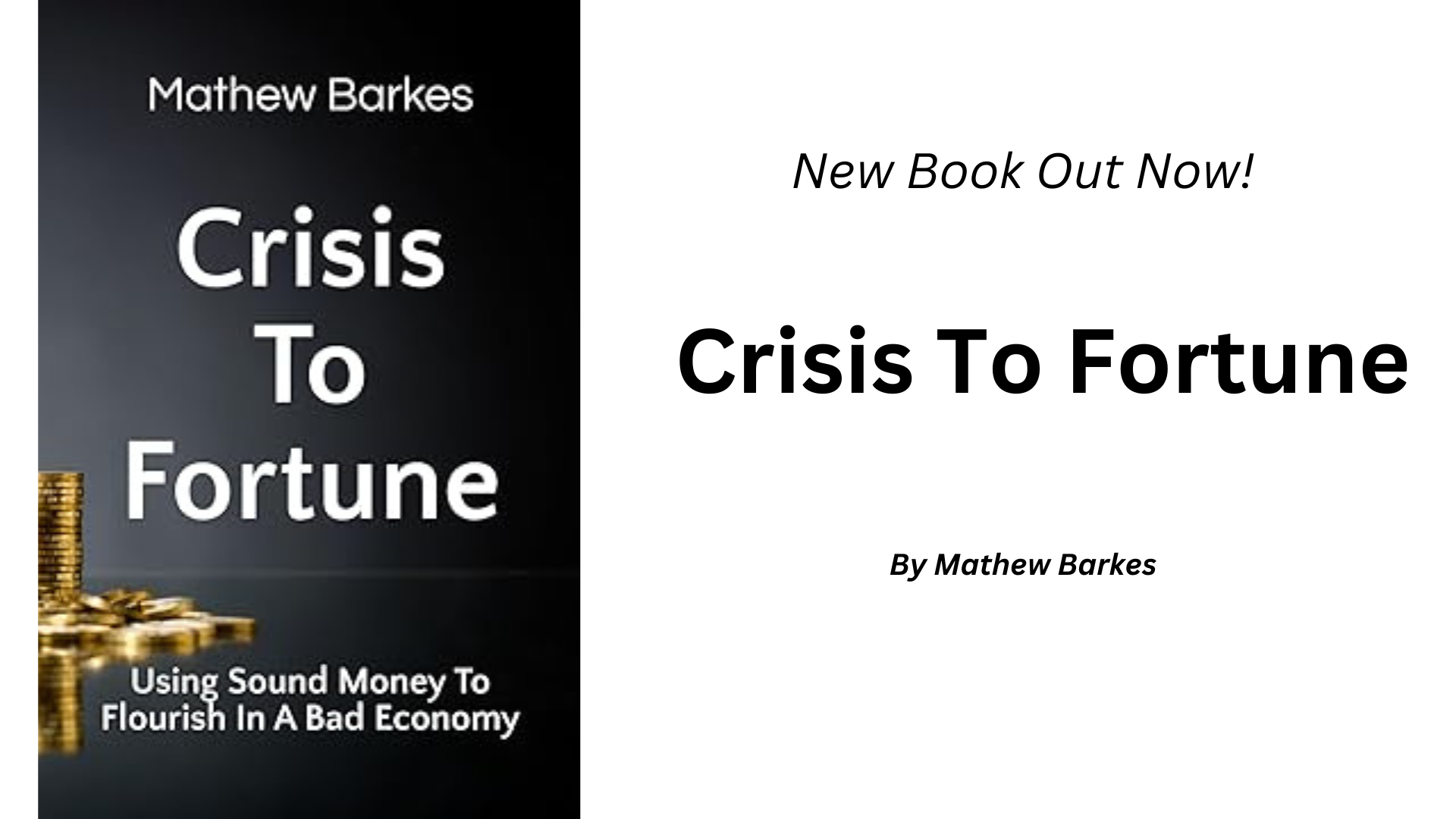Using Sound Money to Flourish in a Bad Economy: A Comprehensive Guide

Mathew Barkes’ “Crisis To Fortune” is a comprehensive guide that equips readers with the knowledge and tools needed to navigate and thrive in a challenging economic environment. The book draws on historical examples, economic theories, and practical strategies to offer actionable advice on how to protect and grow one’s wealth even during financial downturns. Whether you’re an investor, entrepreneur, or someone looking to secure your financial future, this book provides valuable insights into leveraging sound money principles.

The book covers a range of topics, including understanding economic crises, principles of sound money, strategies for financial resilience, wealth protection tactics, growth opportunities in a bad economy, and case studies of successful financial management in tough times. Barkes’ easy-to-understand explanations of complex economic concepts make this book accessible to readers of all backgrounds.
Overall, “Crisis To Fortune” is an essential guide for anyone looking to navigate uncertain economic conditions and secure their financial future. With its practical strategies and historical case studies, this book provides readers with the tools they need to flourish when the economy is struggling.
Key Takeaways
- “Crisis To Fortune” offers actionable advice on how to protect and grow one’s wealth even during financial downturns.
- The book covers a range of topics, including principles of sound money, wealth protection tactics, and growth opportunities in a bad economy.
- With its practical strategies and historical case studies, “Crisis To Fortune” is an essential guide for anyone looking to navigate uncertain economic conditions and secure their financial future.
Understanding Economic Crises

The Nature of Financial Downturns
Economic crises are periods of significant economic decline characterized by a variety of factors, including decreased economic activity, rising unemployment, and falling asset prices. These downturns can be caused by a variety of factors, including changes in government policy, natural disasters, and global economic shocks.
One of the key features of financial downturns is their unpredictability. While some economic downturns can be predicted, others can occur suddenly and without warning. This unpredictability can make it difficult for individuals and businesses to prepare for and respond to the impacts of an economic crisis.
Impact on Personal Finance
Financial downturns can have a significant impact on personal finance. During periods of economic decline, individuals may experience job loss, decreased income, and difficulty accessing credit. These factors can make it challenging to pay bills, save for the future, and invest in assets like real estate and stocks.
However, there are strategies that individuals can use to protect and grow their wealth during financial downturns. By leveraging sound money principles, individuals can minimize their exposure to risk and position themselves for financial success even during challenging economic times.
Overall, understanding the nature of financial downturns and their impact on personal finance is essential for anyone looking to secure their financial future. By staying informed and taking proactive steps to protect their wealth, individuals can thrive even when the economy is struggling.
Principles of Sound Money

Defining Sound Money
Sound money refers to a monetary system that is based on stable and consistent value. It is a system where the value of money is not subject to sudden and unpredictable changes. This stability is achieved by linking the value of money to a tangible asset, such as gold or silver, or by ensuring that the money supply is regulated by a central authority. The goal of sound money is to provide a reliable and predictable medium of exchange that can be trusted by all parties involved in economic transactions.
Historical Significance
The concept of sound money has a long history dating back to ancient civilizations. The use of precious metals, such as gold and silver, as a medium of exchange was common in many cultures. The adoption of paper money in the modern era brought new challenges to maintaining sound money principles. The gold standard was widely used in the 19th and early 20th centuries as a way to ensure the stability of currency values. However, the gold standard was abandoned by many countries in the mid-20th century, leading to increased volatility in currency values.
Sound Money in Modern Economy
In the modern economy, sound money principles are still relevant and important. The stability of currency values is essential for economic growth and stability. The use of fiat currency, which is not backed by a tangible asset, requires careful management by central banks and regulatory authorities to maintain stability. Sound money principles can help to ensure that inflation is kept under control, interest rates are stable, and economic growth is sustainable.
Overall, the principles of sound money provide a framework for creating a stable and reliable monetary system. By ensuring that the value of money is consistent and predictable, sound money principles can help to promote economic growth and stability.
Strategies for Financial Resilience

In “Crisis To Fortune,” Mathew Barkes emphasizes the importance of implementing sound money principles to navigate and thrive in a challenging economic environment. Here are some practical strategies that can help individuals protect and grow their wealth, even during financial downturns.
Asset Allocation
One of the key strategies for financial resilience is asset allocation. This involves spreading investments across different asset classes, such as stocks, bonds, and real estate. By diversifying their portfolio, investors can reduce the risk of losses and potentially increase their returns. Mathew Barkes recommends that investors consider their risk tolerance, investment goals, and time horizon when determining their asset allocation.
Wealth Protection Tactics

When it comes to protecting wealth during tough economic times, it’s important to have a solid plan in place. Mathew Barkes’ “Crisis To Fortune” offers readers practical strategies for leveraging sound money principles to safeguard their finances. Here are some key wealth protection tactics to consider:
Emergency Funds and Liquidity
Having a sizeable emergency fund can help protect your wealth during tough times. This fund should be easily accessible and cover at least six months’ worth of living expenses. In addition, maintaining adequate liquidity in your portfolio can help you weather financial storms without having to sell off assets at a loss. This means keeping a portion of your assets in cash or cash equivalents,
Growth Opportunities in a Bad Economy

In times of economic crisis, it is crucial to identify growth opportunities that can help individuals and businesses thrive. By using sound money principles, it is possible to leverage these opportunities and create wealth even in a bad economy. In this section, we will explore some of the most promising areas for growth and provide actionable advice on how to take advantage of them.

Historical Wealth Preservation
Throughout history, there have been numerous examples of individuals and families who have successfully preserved their wealth during times of economic crisis. One such example is the Rothschild family, who during the Napoleonic Wars, managed to maintain their fortune by using their extensive network of couriers to gain early access to information about the outcome of battles. This allowed them to make informed investment decisions and avoid losses.
Another example is the Medici family, who during the Italian Renaissance, used their banking expertise to become one of the wealthiest and most influential families in Europe. Despite facing economic and political turmoil, the Medici family managed to maintain their wealth through prudent financial management and strategic investments.
In conclusion, these case studies demonstrate that with the right knowledge, strategies, and mindset, it is possible to not only survive but thrive during times of economic crisis. By leveraging sound money principles and making informed investment decisions, individuals and companies can protect and grow their wealth even in the face of adversity.
Implementing Sound Money Strategies
Setting Financial Goals
Before implementing sound money strategies, it’s important to establish clear financial goals. This involves identifying short-term and long-term objectives, such as saving for a down payment on a house or planning for retirement. Once these goals are established, individuals can create a plan to achieve them.
Creating a Personalized Plan
A personalized plan is crucial for implementing sound money strategies. This plan should take into account an individual’s unique financial situation, including income, expenses, and debt. It should also include a budget that outlines how income will be allocated towards achieving financial goals. This plan should be regularly reviewed and adjusted as needed.
Adapting to Economic Shifts
Economic conditions are constantly changing, and it’s important to be able to adapt to these shifts. This may involve adjusting investment strategies, reallocating funds, or seeking out alternative sources of income. By staying informed about economic trends and being flexible, individuals can better position themselves to thrive during challenging economic times.
Overall, implementing sound money strategies requires careful planning, flexibility, and a commitment to achieving financial goals. By following the principles outlined in “Crisis To Fortune,” individuals can protect and grow their wealth even during times of economic uncertainty.
Conclusion
In “Crisis To Fortune,” Mathew Barkes provides readers with a comprehensive guide to navigating and thriving in a challenging economic environment. The book offers practical strategies for leveraging sound money principles, historical case studies highlighting successful financial management in tough times, and easy-to-understand explanations of complex economic concepts.
Readers will gain valuable insights into economic crises and their impacts on personal finance, as well as tips for protecting and growing their wealth in uncertain economic conditions. Barkes’ analysis of historical examples and economic theories provides readers with actionable advice to protect and grow their wealth even during financial downturns.
The book is written in a confident, knowledgeable, and neutral tone, making it accessible to a wide range of readers, whether they are investors, entrepreneurs, or individuals looking to secure their financial future. The easy-to-understand explanations of complex economic concepts make the book a valuable resource for anyone looking to improve their financial literacy.
Overall, “Crisis To Fortune” is a must-read for anyone looking to thrive in a challenging economic environment. The practical strategies and insights provided by Barkes will equip readers with the knowledge and tools needed to flourish when the economy is struggling.

Overall, “Crisis To Fortune” is a must-read for anyone looking to thrive in a challenging economic environment



